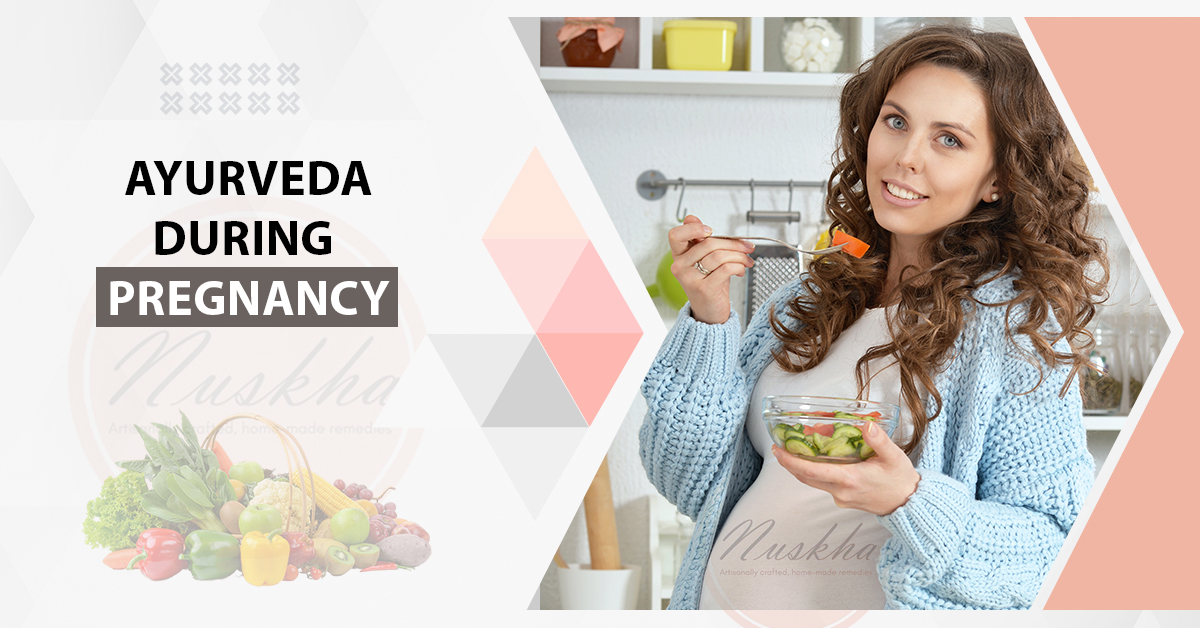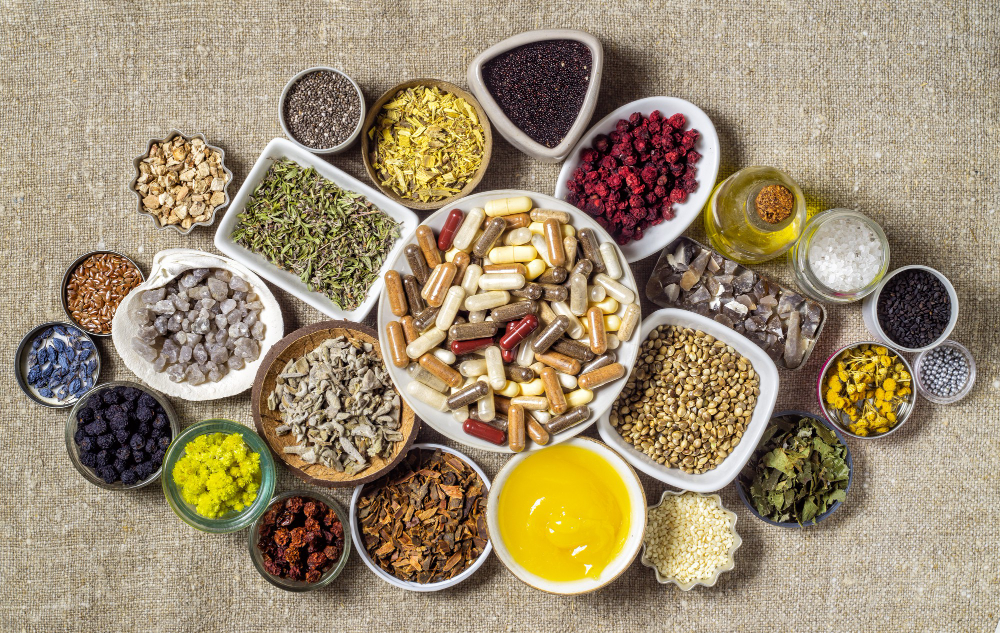
A woman's pregnancy is a wonderful time in her life. As she goes through the changes of this time, she not only changes into a new person, but she also learns more about herself.
Ayurvedic knowledge that goes back more than 5,000 years has given us some helpful tips on how to use Ayurveda to help pregnant women feel less stressed and more excited about the journey.
Even though pregnancy is supposed to be a happy time, it can be hard for many women to adjust to the changes and feel like they are doing enough for their baby's health and well-being.
A healthy diet is one of the most important things for a pregnant woman and her baby's growth. According to the Vedic texts of Ayurveda, the food or energy that comes from the mother's diet has three very important roles.

During pregnancy and childbirth, every cell in the mother's body changes. This makes it even more important for her to eat a healthy, well-balanced diet. Here are some rules and suggestions from Ayurveda about what the mother and baby should eat to stay healthy.
Milk: Give the baby a cup of warm, boiled cow's milk once or twice a day to improve his or her immune system, skin, and ojas. During this time, you should also make sure to get enough calcium.
Buttermilk: After lunch, drink a small glass of fresh buttermilk that you made yourself. It makes you hungrier, helps you digest food better, reduces stomach problems and swelling, and keeps you from getting constipated.
Ghee: Every day, eat ghee made at home from cow's milk. It makes both the mother and the baby smarter and gives the mother more energy.
Butter: Eating a little butter with a little crystal sugar gives you strength, makes you want to eat more, gives mother and baby's skin a healthy glow, keeps you from getting constipated, and stops you from complaining about piles and fissures.
During pregnancy, there are some foods you should avoid or at least eat less of. These include foods with artificial flavours, preservatives, or chemical additives, foods that are too hot or spicy, undercooked beans and lentils, aloe vera, and foods like pizza, burgers, noodles, Chinese food, fermented foods, stale food, cold drinks, aerated drinks, and chips.
Eat foods like black currants, lemon, amla, green leafy vegetables, beet, dates, dry or fresh figs, pomegranates, or jaggery that are good natural sources of iron. These not only help you avoid the bad side effects of western medicines like constipation, which is a common side effect of iron tablets, but they also help you stay healthy.
Pulses, sprouts, dal, eggs, lentils, and rotis made from wheat or jowar flour are all good sources of protein. Avoid sprouts that are raw.
Drink more water than you usually do. Be sure to drink water that's been boiled. Also, coconut water is a good drink to help you feel better. It not only makes you feel better when you're thirsty, but it also takes care of your water levels and amniotic fluid when you're pregnant.
Freshly made juices of lime, pomegranate, amla, and kokam sharbat can be eaten because they are good for your health, keep you and your baby hydrated, and reduce acidity.
It is a common and important herb that mothers all over the world use. It makes the fetus's skin look and feel better, and it strengthens the heart. The best way to use it is with warm milk.
Make it a daily practice to eat at least one fruit as well as dry fruits like almonds, figs, dates, cashews, and walnuts. This should become a habit. Milkshakes, papaya, pineapple, and kiwi should all be avoided at all costs.
According to Ayurveda, there are nine symptoms that might accompany pregnancy and are referred to as garbhopadravas. These conditions are as follows: nausea, dryness of mouth, fever, oedema, anorexia, vomiting, anaemia, diarrhoea, and fluid retention. It is possible to avoid these issues and maintain a healthy pregnancy by adhering to the dietary and lifestyle recommendations provided by ayurveda.
Don't forget that you have to eat for two different types of bodies. In moderation, give in to your cravings, especially after four months of pregnancy, when cravings are most likely. The most important piece of advice is to eat when you're hungry and get enough protein, healthy carbs, and vegetables.
During pregnancy, the vata dosha needs more care because it affects the energy of the nervous system. The best way to take care of vata is to eat fresh, plant-based, whole or sprouted grains, and foods that haven't been processed.
Foods made with healthy oils like olive, ghee, and coconut that are warm and just cooked are good. Vata is balanced by sweet, sour, and salty tastes.
During pregnancy, you should focus on sweet tastes because they are the healthiest for the baby. Drink warm, non-homogenized, vat-pasteurized (heated to less than 135 degrees F) milk with ghee from grass-fed cows.

People say that giving a baby one cup of warm milk with a teaspoon of ghee twice a day will improve the baby's immune system, skin, and vitality (ojas).
When mom is calm, baby is calm, too. A daily massage with an ayurvedic massage oil made with herbs feeds the skin's microbiology and calms the mother's skin-based sensory nervous system. Self-massage or massage from a loving partner are both great ways to feel better. To get ready for breastfeeding, gently massage the belly and spend more time on the nipples in the eighth and ninth months.
Even if you are early or late in your pregnancy, you can still enjoy sexual activity. Just make sure to do it in moderation. Too much sex can make vata worse.
You can eat small pinches of powdered cardamom seeds throughout the day.
Sip hot water mixed with 1/4 teaspoon of ginger powder or fennel seeds.
Abhyanga, which is a type of ayurvedic therapeutic massage, followed by a bath in lukewarm water is a great treatment for both mother and baby during pregnancy. People also think that doing abhyanga regularly after the sixth month makes it easier to give birth.
Other ways to calm the nervous system include head massage, belly massage, foot massage, and Shirodhara. Other important internal and external therapies need the help of a specialist to make sure they are done right.
During your pregnancy, Ayurveda can help you in many ways. Please make an appointment with one of our specialist doctors if you want professional and personalised health advice.
Drugs should be avoided as much as possible during the first three months of pregnancy and even after that. The experienced doctors at Vibrant Ayurveda can recommend safe and effective herbal preparations and home remedies for prenatal and postnatal care.
No matter where you are in your pregnancy, whether it's the beginning or the end, remember to put rest first. This is a time when your body, emotions, and spirit are all growing. Even with unpleasant symptoms, it is a beautiful process. This is the time to pay close attention to what your body needs.